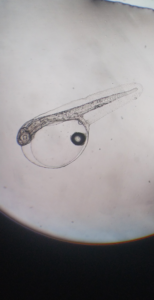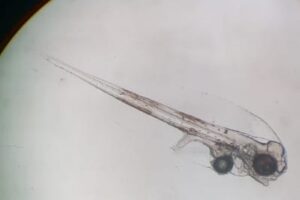The Silver or Goldlined seabream fish (Rhabdosargus sarba) belongs to sparidae family is widely distributed in the Indo-West Pacific region. It is considered as one of the widely preferred food fishes in India due to its white tender meat and fetches a premium price @ Rs.400-500/kg in the domestic market. Being a euryhaline species, R. sarba has a better potential for farming both in the ponds and cages.
ICAR-CIBA, Chennai has initiated the broodstock development and breeding of R. sarba in captivity at finfish hatchery in its Muttukkadu Experimental Station. About 45 brood fishes in the size ranged from 350g to 1800g have been maintained in the Recirculation Aquaculture System and small volume cages for two years since December, 2020. One of the bright features of the species is its easy adaptability to formulated feed, from rearing to captive maturation and this indicates its domestication potential.
Mature males in oozing condition and females with developing oocytes observed from the 1st week of November 2022. During 2nd week of December 2022, female fish (917g) had an oocyte diameter of 414 µm and two oozing males (907g & 240g) were administered with HCG and LHRHa hormones as priming and resolving doses at 24 hrs intervals. After 12 hrs of resolving dose, spontaneous spawning observed on 9th December 2022 and total of 7000 eggs (878 µm) collected. Fertilization and hatching rates estimated were @ 71% and 40% respectively. The newly hatched larvae were measured with the size of 1.92mm. The Incubation time was estimated as 16 hours at 35 ppt salinity and 25ºC water temperature. The fish is probably a batch spawner, where the same fish released the second batch of eggs @ 8000 nos after 45 hrs (11th December 2022) of first spawning. The larvae were stocked in the larval rearing tanks and rearing is under progress.
This is first report on the captive breeding of Goldlined seabream in India. This breakthrough opens a new vista and adds a new species for research on various aspects of captive propagation with an aim to harness commercial aquaculture potential.
Developing Embryo
Newly hatched larvae
24 hr post hatch larvae



